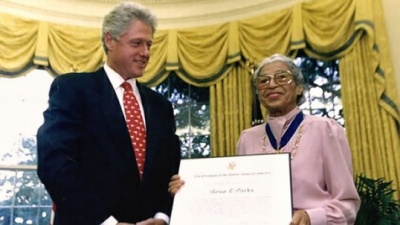USA: Rosa Parks and the beginning of the American Civil Rights Movement
1955[edit]
By 1955, racial segregation still existed across large sections of American society. For both black and white Americans it was believed that the oppression of an entire section of American society, codified through state and local laws commonly referred to as Jim Crow laws, ran contrary to America's core principles. For many years before 1955, black Americans had been informed, organized, and committed to changing their situation for the better, but they knew they could not do it alone. Rosa Parks would create the spark that called the attention of an entire nation and inspired it to change.
On December 1, 1955, Rosa Parks, a seamstress on her way home from work, refused to abide by the city of Montgomery's law segregating public buses. When Mrs. Parks refused to give up her seat for a white passenger, she was arrested. Her single act of civil disobedience, supported by a belief in equal treatment for all, was both spontaneous and courageous. She captivated the spirit of a nation that inspired the African-American Civil Rights Movement and the end of segregation in America. By December of 1956 the U.S. Supreme Court ruled Montgomery's segregation laws unconstitutional and the buses were racially integrated. In 1996, Mrs. Parks was awarded the Presidential Medal of Freedom by President Bill Clinton, the highest honor of the executive branch.
